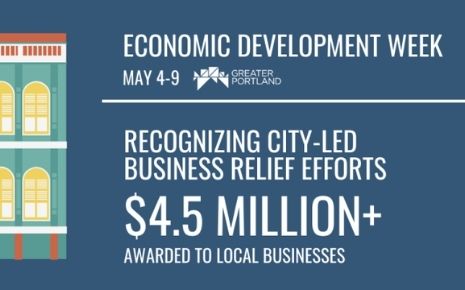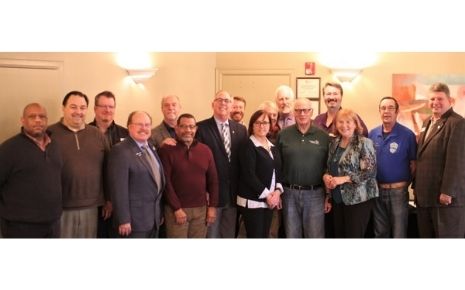
15 May 2020
GPI in the News
This column appeared in the Business Tribune. Matt Miller, Greater Portland Inc's interim president and CEO, writes a monthly column for the local newspaper.
This pandemic has been extremely challenging for our region. The human cost is sobering, and the economic impact is devastating. But responses by cities, companies and community members throughout Greater Portland are inspiring.
Our region has stepped up with creative solutions to offer grants to small businesses, produce masks and sanitizer for front-line workers, and encourage residents to support local businesses.
Greater Portland cities in particular acted quickly to stand up grant funds collectively delivering more than $7 million to local small businesses. Each city had its own approach, tailored to its community:
- The City of Happy Valley and the City of Beaverton helped businesses pay commercial rent or mortgage expenses.
- The City of Gresham targeted its grants to food and beverage businesses.
- Prosper Portland, the city’s economic development agency, partnered with Asian Pacific American Network of Oregon (APANO) to provide grants for businesses in the Jade District and Old Town/Chinatown.
- The City of Tigard partnered with Micro Enterprise Solutions of Oregon (MESO) to award grants to small businesses.
- The City of Wilsonville, the City of Tualatin and Prosper Portland used weighted point systems in an effort to award grants equitably.
- Wood Village established a utility relief fund to help small businesses pay utility bills.
And city governments helped local businesses beyond grants. This type of full-service economic development work is crucial in these tough times.
Many provided technical assistance:
- The Columbia River Economic Development Council (CREDC) has hosted a series of business resource calls with experts in various fields.
- The City of Sherwood created a volunteer business mentoring group that helped businesses apply for the SBA’s PPP and EIDL programs.
- The City of Lake Oswego and the City of Gresham established business assistance teams to help connect business owners with state and federal resources.
And other cities found creative ways to support local businesses:
- The City of Wilsonville purchased $20,000 in gift cards from local restaurants and donated them to Wilsonville Community Sharing to provide meals for people in need.
- The City of Vancouver has designated May “Support Small Business Month,” offering a calendar of workshops and featuring positive stories on local businesses.
- Prosper Portland partnered with Grubhub to defer the fee collections for independent restaurants.
Impressively, many Greater Portland businesses have pivoted to manufacture personal protective equipment (PPE) and hand sanitizer for front-line workers and community members.
- Paula Hayes, owner of Beaverton cosmetics company Hue Noir, started making hand sanitizer after her cosmetics sales fell dramatically. Demand has been overwhelming. As of April 1, she had produced 25,000 units.
- Ryan Moor (pictured above), founder of Vancouver screen printing equipment manufacturer Ryonet, pivoted to PPE for hospitals.
- Portland footwear maker KEEN converted a production line at its Thailand factory to produce face masks. Keen donated 100,000 masks to front-line workers.
- A group of 3-D printing advocates led by Intel manager Shashi Jain organized Makerforce, a crowdfunded pop-up supply chain that allows anyone with a 3-D printer to produce PPE components for local hospitals.
Other local businesses found innovative ways to continue operations by introducing new products or shifting their business models.
- Nat West, of Reverend Nat's Hard Cider, used to sell his ciders to bars and grocers through a distributor, but shifted to direct-to-consumer delivery when those orders fell. He’s been able to re-hire his staff and appreciates the direct communication with customers.
- Oregon City Farmers Market shifted to a pre-order drive-thru market, and posted vendor contact information on its website.
- Portland’s Afuri now offers DIY ramen kits for delivery and takeout. The kits include instructions and individually portioned ingredients, allowing customers to recreate the signature ramen at home.
- Cornelius movie house Act V Theaters now offers drive-in movies which are projected on the outside wall of the theater.
These examples show that even in the midst of an unprecedented public health and economic crisis, our cities, entrepreneurs and business owners in our region are innovative and collaborative. Above all, they strive to help each other to make our region stronger.
More Topics

Economic Development Week: GPI Highlights Business Support Efforts, Creative Company Pivots
May 4 2020


